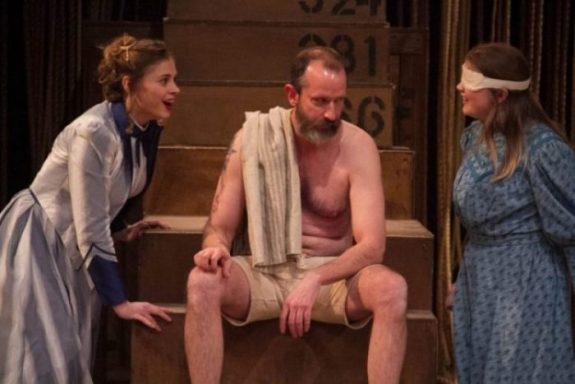
Lydie Breeze trilogy by John Guare. Directed by Lane Savadove. EgoPo Classic Theater. April 2018.
John Guare’s Lydie Breeze trilogy has now concluded with EgoPo’s production of the third part, titled Madaket Road (which the playwright originally called Home.) The trilogy is an ingenious creation, following a small group of people from a Civil War battlefield to political machinations at the start of the 20th century.
One of the central characters is a potential candidate for president. He is a tool of corrupt oligarches in the Republican party. Newspaper publisher William Randolph Hearst is in collusion with them, inciting America into a war with Spain.
As the times have changed, so have the ideals and the actions of the characters, some of them in radically unpredictable ways. It’s a parallel to the United States’s evolution from the 1860s to the 1900s. Guare has framed the story in differing dramatic styles. As I noted in a story before the premiere, Guare’s form changes with the content.
The first play, named Cold Harbor after the 1864 battles near Richmond Virginia, is an adventure story, a melodrama with vaudeville elements. The second play, Aipotu, is named for a Utopian commune which the characters establish on Nantucket after the war (the title is Utopia spelled backwards) and has the form of psychological realism. In the third play, the survivors and the next generation grapple with the crumbling of their family and with the physical crumbling of their part of the island into the sea. The internal journeys of the participants are displayed with fantastical expressionism. This stylistic choice is daring.
Another hallmark of the trilogy is Guare’s placing of crucial action off stage. While that violates the norms of good theater, it’s a return to the tradition of classic Greek drama: showing peoples’ reactions to events that we don’t actually see. This occurred between the two acts of part two, and it occurs again at the start of part three when we learn that Lydie has committed suicide. The remainder of the play shows how everyone deals with that fact (while the superb Melanie Julian, as Lydie in flashbacks, gets too little stage time.)
Some of Guare’s choices, like that death, may bother some viewers. I regret that the play never examines what caused the idealism of the Utopian commune to disintegrate; blaming it on a sexual affair is too glib. Another complaint is that some earlier cliff-hangers are left dangling. For example, a mutiny at sea in Cold Harbor was presented from two disparate viewpoints, and we never get a complete explanation of the struggles between Lydie’s brother and father, nor find out who was telling the truth. Still, the unique ways in which Guare presents his saga are provocative. The trilogy impresses as an epic and also as a series of personal stories.
One fact is certain: the production by Lane Savadove is masterful, and the performances of his cast members are marvelous. Many stunning images are presented by the director, elevating the trilogy beyond the words on the page. The configuration of the theater’s interior changes according to each play’s content. Repeatedly, the audience experiences action moving toward them from great distances, upon the unsteady foundations of sand or water. Ropes are ever-present, underlining key elements in the drama. Markéta Fantová’s sets are arresting. Period-based music by Jay Ansill and Cynthia Hopkins is atmospheric.
Lydie started these plays as an idealistic and nurturing young woman, and Guare turns her into a badly-compromised person who (unintentionally) inflicts harm on those around her. The surrounding history-based story is just as melancholy — a tale of a nation that failed to follow what Lincoln called its “better angels.”
In addition to the powerful performance of Julian, great contributions are made in Madaket Road by Charlie DelMarcelle as the husband Joshua, Kylie Westerbeck as their daughter Young Lydie, Kristie Ecke as her sister Gussie, Hannah Gold as the caretaker Beatty, and Grant Struble as the out-of-wedlock young man who moved to England and became a successful actor.
Guare wrote these plays many years ago but they have never been presented as a unit. He recently changed the titles of the individual plays; which, I surmise, was to indicate that each of them have been edited during his working partnership with EgoPo.
Lydie Breeze might be considered as Guare’s Ring of the Nibelungen in its grand scope. Unfortunately, the culmination of this saga is a letdown. The hopes and plans of the principal players have crumbled. Their epic ends in a whimper.
To read about the first two plays in the trilogy, click Part One and Part Two.